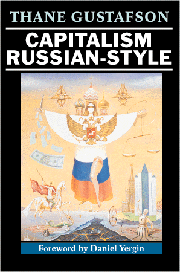Book contents
- Frontmatter
- Contents
- Foreword by Daniel Yergin
- Acknowledgments
- Prologue
- 1 The new Russian Revolution: false start or dead end?
- 2 Creating owners: insider privatization and its consequences
- 3 Wall Street comes to Moscow
- 4 The rise and fall of the private banks
- 5 No capitalism without capitalists: entrepreneurship in the new Russia
- 6 Russia's epidemic of crime
- 7 Toward the rule of law?
- 8 Beyond coping: toward the recovery of Russian society
- 9 The shrinking Russian state and the battle for taxes
- 10 Conclusion: halfway to the market Russia on the eve of the twenty-first century
- Bibliography
- Index
8 - Beyond coping: toward the recovery of Russian society
Published online by Cambridge University Press: 22 September 2009
- Frontmatter
- Contents
- Foreword by Daniel Yergin
- Acknowledgments
- Prologue
- 1 The new Russian Revolution: false start or dead end?
- 2 Creating owners: insider privatization and its consequences
- 3 Wall Street comes to Moscow
- 4 The rise and fall of the private banks
- 5 No capitalism without capitalists: entrepreneurship in the new Russia
- 6 Russia's epidemic of crime
- 7 Toward the rule of law?
- 8 Beyond coping: toward the recovery of Russian society
- 9 The shrinking Russian state and the battle for taxes
- 10 Conclusion: halfway to the market Russia on the eve of the twenty-first century
- Bibliography
- Index
Summary
Lake Baikal, June 1998:
It's a gray, windy day on Lake Baikal, and there's a steady swell from the north as the Mirage slices her way through the brooding mass of icy water. Igor steers the boat, while his partner bustles about the cabin, laying out vodka and herring for his guests. Both are doktora nauk, senior research scientists with international reputations. But when their institute stopped paying wages in 1991, Igor and his partner turned to their first love, the Mirage, a 50–foot cutter they had rescued from the scrapheap ten years before and had lovingly restored, with coat upon coat of gleaming white and blue paint. For years they had sailed Lake Baikal as a hobby. They became authorities on the lake's unique fauna and flora. In 1993 they took the plunge. They resigned from their institute – an unheard-of move in Soviet times – and began a new life as charter captains. “The Mirage was our hobby; now it's our livelihood,” says Igor. “But we're the lucky ones.”
Fili, November 1997:
There is no sign, no gate – but everyone in Moscow knows the place as the teletolkuchka, Moscow's outdoor wholesale electronics market. You will find it in an unpaved vacant lot in the Fili district of Moscow's northwest. On Saturday mornings crowds of customers walk down the muddy spaces between solid rows of parked trucks. Fast-talking young men with fat sheaves of rubles in both fists stand at the open back of each truck and hawk their wares – boxes of Aiwa tape players and Toshiba VCR's and everything else under the cybersun, stacked high and moving fast.
I am talking to a man loading boxes of VCR's into his Gazelle pick-up. He's a retailer from a nearby town. “There is a lot of money in Russia,” he says. “The statistics may not show it. But you can just smell it.”
- Type
- Chapter
- Information
- Capitalism Russian-Style , pp. 170 - 191Publisher: Cambridge University PressPrint publication year: 1999



